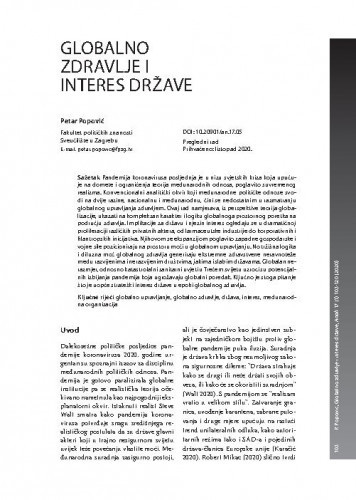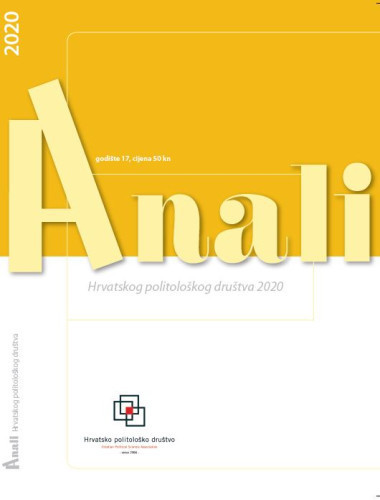Pandemija koronavirusa posljednja je u nizu svjetskih kriza koja upućuje na domete i ograničenja teorija međunarodnih odnosa, poglavito suvremenog realizma. Konvencionalni analitički okvir koji međunarodne političke odnose svodi na dvije razine, nacionalnu i međunarodnu, čini se nedostatnim u razmatranju globalnog upravljanja zdravljem. Ovaj rad namjerava, iz perspektive teorija globalizacije, ukazati na kompleksan karakter i logiku globalnoga prostornog poretka na području zdravlja. Implikacije za državu i njezin interes ogledaju se u dramatičnoj proliferaciji različitih privatnih aktera, od farmaceutske industrije do korporativnih i filantropskih inicijativa. Njihovom se ekspanzijom poglavito zapadne gospodarske i vojne sile pozicioniraju na prostoru moći u globalnom upravljanju. No tržišna logika i difuzna moć globalnog zdravlja generiraju ekstremne zdravstvene neravnoteže među razvijenima i nerazvijenim društvima, jakima i slabim državama. Globalan nerazmjer, odnosno katastrofalni sanitarni uvjeti u Trećem svijetu uzroci su potencijalnih izbijanja pandemija koja ugrožavaju globalni poredak. Ključno je stoga pitanje što je uopće strateški interes države u epohi globalnog zdravlja.; The coronavirus pandemic is the last in a row of global crises that have shed light on the reach and the limitations of international relations theories, especially contemporary realism. The conventional analytical framework that narrows international political relations down to just two levels of analysis, the national and the international, seems inadequate for considering the issue of global health management. This article, therefore, intends to highlight the complex character of and the logic behind global spatial order in the area of global health from the perspective of the sociology of globalization. The implications for the state and its interest are reflected in the dramatic proliferation of different private actors, from pharmaceutical industries to various corporate and philanthropic initiatives. Their expansion has facilitated the positioning of particularly Western economic and military forces in the power arena of global management. However, market logic and the diffuse power of global health have been generating serious global health imbalances between the developed and underdeveloped societies, between strong and weak states. Global disproportion i.e. the catastrophic sanitary conditions in the Third World are in fact the root of potential threats and pandemic outbreaks which, in turn, threaten the very global order. The crucial question thus becomes: What is actually the strategic interest of the state in a global health era?
Sažetak

 Anali Hrvatskog politološkog društva : časopis Hrvatskog politološkog društva : 17,1(2020) / glavna i odgovorna urednica Mirjana Kasapović.
Anali Hrvatskog politološkog društva : časopis Hrvatskog politološkog društva : 17,1(2020) / glavna i odgovorna urednica Mirjana Kasapović.